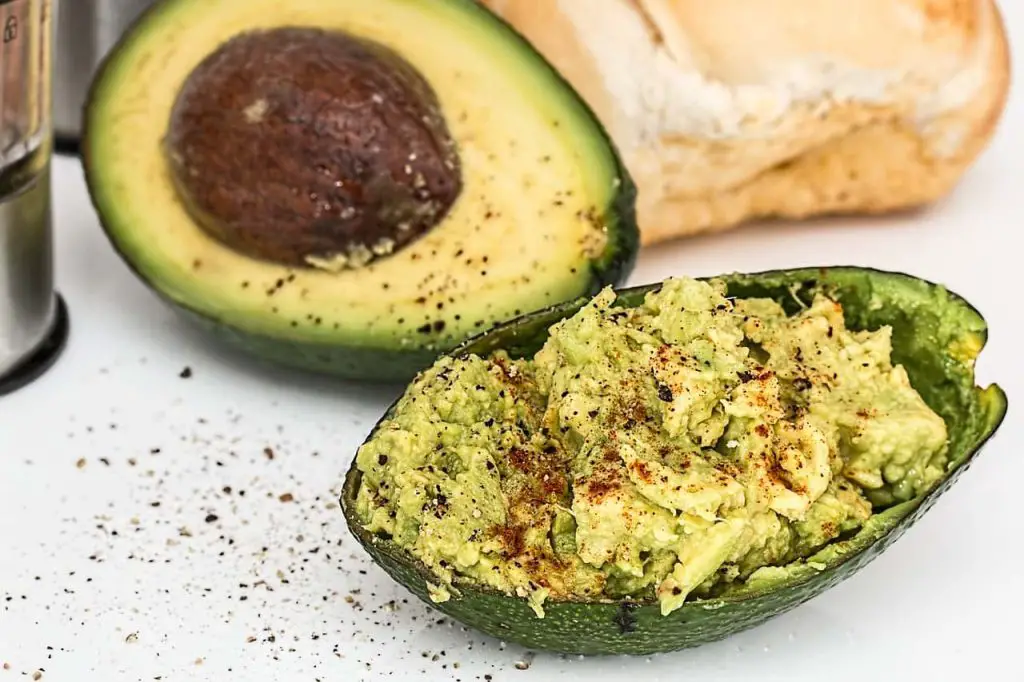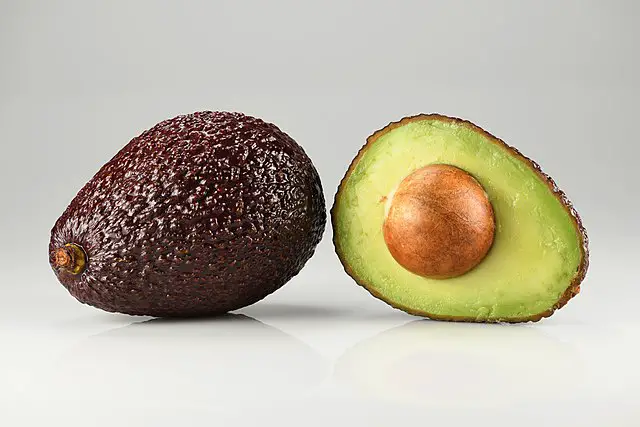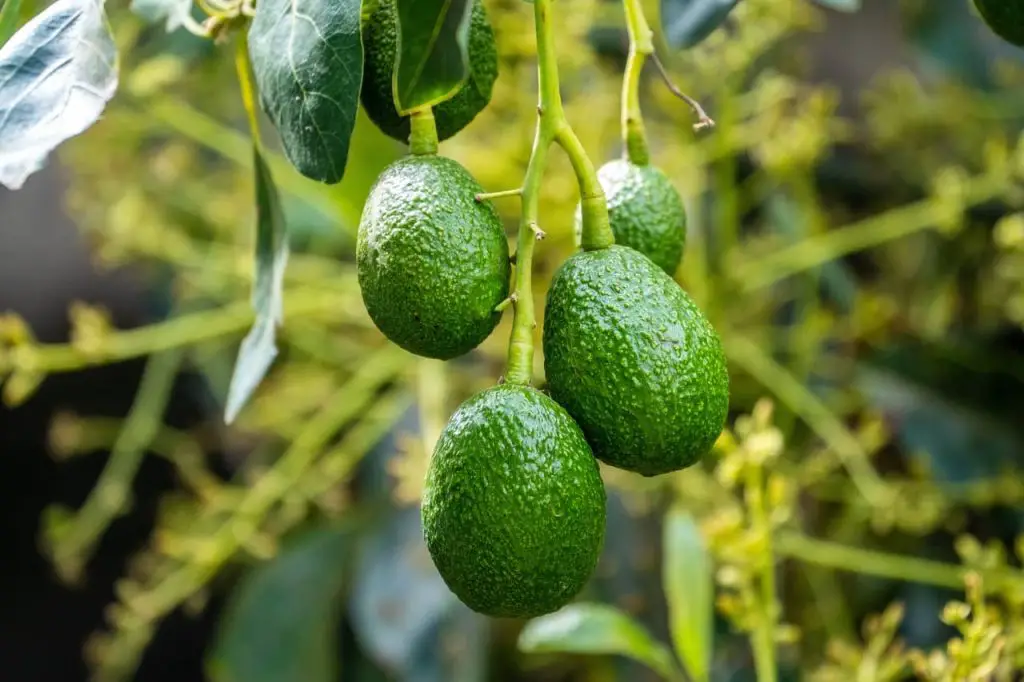Avocado: Here at healthfulhub.com, we participate in affiliate programs and may earn a commission if you make a purchase, at no additional cost to you. Learn more
Introduction: The Avocado
Avocado, the creamy green fruit often referred to as “nature’s butter,” is not only a culinary delight but also a nutritional powerhouse. Beyond their delicious taste and versatile applications, avocados boast an array of health benefits that make them a valuable addition to any diet. Today, I will share with you the top health benefits of avocados. I’ll highlight a few popular varieties and give you a little historical information. Please join me to discover how truly amazing this healthy superfood really is!
Nutrient Density
Avocados are a nutrient-dense fruit packed with essential vitamins and minerals. They are an excellent source of monounsaturated fats1, which promote heart health by lowering bad cholesterol levels. These healthy fats also aid in the absorption of fat-soluble vitamins like A, D, E, and K, enhancing overall nutritional uptake.
Rich in Fiber
One of the standout health benefits of avocados is their high fiber content. Fiber plays a crucial role in digestive health by promoting regular bowel movements and preventing constipation. Additionally, it contributes to weight management by inducing a feeling of fullness and reducing overall calorie intake.

Heart Health
Avocados have earned their reputation as a heart-healthy food due to their unique combination of monounsaturated fats, potassium, and folate. Potassium helps regulate blood pressure, while folate reduces the risk of cardiovascular diseases by metabolizing homocysteine2, a compound linked to heart issues.
Eye Health
Lutein and zeaxanthin, two essential antioxidants found in avocados, contribute to eye health by reducing the risk of age-related macular degeneration and cataracts. These compounds protect the eyes from harmful high-energy light waves like ultraviolet rays.
Blood Sugar Regulation
The monounsaturated fats in avocados play a role in stabilizing blood sugar levels. This can be particularly beneficial for individuals with type 2 diabetes. The fiber content also aids in preventing rapid spikes and crashes in blood sugar, promoting overall glucose control.
Anti-Inflammatory Properties
Avocados contain various compounds, including polyphenols3 and flavonoids4, that exhibit anti-inflammatory effects. Chronic inflammation is linked to numerous health issues, such as arthritis and cardiovascular diseases. Regular consumption of avocados may help mitigate inflammation, promoting overall well-being.

Weight Management
Despite their relatively high calorie content, avocados can be a valuable ally in weight management. The monounsaturated fats contribute to satiety, reducing the likelihood of overeating. Additionally, the fiber content aids in digestion and helps control appetite, making avocados a satisfying and healthy snack option.
Skin Health
The benefits of avocados extend beyond internal health to external well-being. The high levels of vitamins E and C, along with monounsaturated fats, nourish the skin from within. These nutrients contribute to skin elasticity, hydration, and protection against oxidative damage, promoting a radiant complexion. Later, we will take a look at avocado oil and how it also benefits skin health.
Enhanced Nutrient Absorption
Avocados act as nutrient boosters, enhancing the absorption of fat-soluble vitamins and antioxidants from other foods. Adding avocado to salads or incorporating it into meals can amplify the nutritional value of the entire dish, ensuring your body absorbs essential nutrients effectively.

Bone Health
Vitamin K, present in avocados, is vital for bone health as it helps in calcium absorption and bone mineralization. A diet rich in vitamin K is associated with a lower risk of fractures and bone-related issues, making avocados a valuable component of a bone-friendly diet.
Transitioning to a Healthier Diet
Incorporating avocados into your diet doesn’t mean a drastic overhaul; it can be a simple yet effective step towards a healthier lifestyle. Whether sliced on toast, blended into a smoothie, or mashed into guacamole, avocados offer endless possibilities for both sweet and savory dishes.
Balancing Act: Fats and Health
Despite the misconception that all fats are harmful, avocados exemplify the importance of incorporating healthy fats into our diet. The monounsaturated fats found in avocados are essential for various bodily functions, including hormone production and cell membrane structure.
- All in one tool splits, pits and slices avocados
- Stainless steel pitter removes pit with one quick twist
- Slicer lifts fruit from skin in seven perfect pieces
- Soft, comfortable non slip grip
- Top rack dishwasher safe
Culinary Versatility
Avocados’ neutral flavor and creamy texture make them an ideal addition to a wide range of dishes. From salads and sandwiches to desserts and smoothies, avocados lend a satisfying richness while contributing numerous health benefits. This culinary flexibility ensures that individuals can enjoy avocados in diverse ways, making them a practical and enjoyable choice for any meal. My favorite way to eat avocado is simple: smashed avocado on toasted home-made sourdough bread, with freshly ground black pepper and pink Himalayan salt.
Digestive Harmony
Avocado’s high fiber content, primarily insoluble fiber, promotes a healthy gut by supporting regular bowel movements and preventing constipation. This fiber also acts as a prebiotic, nourishing beneficial gut bacteria and fostering a balanced and thriving digestive system.
Stress Reduction
B vitamins, particularly folate, found in avocados, are associated with mood regulation and stress reduction. Folate helps in the production of neurotransmitters like serotonin5, contributing to an improved mood and potentially reducing symptoms of anxiety and depression.
Antioxidant Defense
Avocados are rich in antioxidants, including vitamin E, vitamin C, and various phytochemicals6. These compounds neutralize free radicals in the body, protecting cells from oxidative stress and reducing the risk of chronic diseases, including certain cancers.
Joint Health
The anti-inflammatory properties of avocados may extend to joint health, potentially providing relief for individuals with arthritis. While more research is needed in this area, the presence of compounds like polyphenols suggests a positive impact on joint function and comfort.
In essence, avocados offer a multifaceted approach to health, addressing various aspects from heart and eye health to weight management and digestive well-being. Furthermore, the transition to a healthier lifestyle is seamless, given the culinary versatility of avocados.
To sum up, avocados serve as a nutritional powerhouse, contributing to overall health in numerous ways. As we examine the wide range of advantages associated with avocados, it becomes evident that this humble fruit is more than just a trendy ingredient—it’s a valuable ally in the pursuit of a healthier, more balanced life.
Avocado Oil: Health Benefits and Manufacturing Techniques
The Health Benefits of Avocado Oil
While the fruit itself holds a myriad of health benefits, avocado oil, extracted from the pulp of the avocado, offers a concentrated source of these advantageous properties. Rich in monounsaturated fats, particularly oleic acid7, avocado oil mirrors the heart-healthy attributes of the fruit. Incorporating this oil into your diet may contribute to lower levels of bad cholesterol, promoting cardiovascular well-being.
Beyond its cardiovascular benefits, avocado oil is a potent antioxidant. Packed with vitamin E, it helps combat oxidative stress, reducing the risk of chronic diseases and supporting overall cellular health. Additionally, the oil’s anti-inflammatory properties may alleviate joint discomfort, offering potential relief for conditions like arthritis.
Avocado Oil for Skin Health
Avocado oil has emerged as a skincare elixir, celebrated for its nourishing and rejuvenating properties. Packed with vitamins E and C, essential fatty acids, and antioxidants, avocado oil deeply moisturizes the skin, promoting elasticity and preventing dryness. Its ability to penetrate the skin’s layers makes it an effective emollient, soothing and softening even the driest skin. The oil’s anti-inflammatory properties may aid in reducing redness and irritation, making it a gentle option for sensitive skin.
Additionally, avocado oil’s natural collagen-boosting elements contribute to the skin’s resilience and suppleness, diminishing the appearance of fine lines and wrinkles. Whether used as a standalone facial oil, incorporated into moisturizers, or added to DIY masks, avocado oil has become a go-to choice for those seeking a natural and holistic approach to vibrant and nourished skin.
Manufacturing Techniques: Cold-Pressed vs. Refined
The process of extracting avocado oil significantly influences its nutritional composition and potential health benefits. Two common manufacturing techniques—cold-pressed and refined—yield distinct variations in terms of quality and nutritional value.
Cold-Pressed Avocado Oil:
- Method: Cold-pressed extraction involves mechanically pressing the avocado pulp at low temperatures, typically below 120°F (49°C), to preserve the oil’s natural flavors and nutritional content.
- Benefits: This method retains the oil’s rich flavor, vibrant color, and a higher concentration of heat-sensitive nutrients like vitamin E and phytochemicals.
- Ideal Use: Cold-pressed avocado oil is best suited for drizzling over salads, dips, or as a finishing oil for dishes where its robust flavor can shine.
- 100% Pure and Natural Avocado Oil Organic Cold Pressed
- Botanical Name: Persea americana
- Method: Cold Pressed
- Nature's Elixir, Skin Savior, Hair Transformation, Versatile Beauty
- Country: USA
Refined Avocado Oil:
- Method: Refined avocado oil undergoes a more intensive processing method, including the use of heat and chemicals to extract the oil. This process eliminates impurities and neutralizes the oil’s flavor.
- Benefits: Refined avocado oil has a higher smoke point, making it more suitable for high-temperature cooking. It also has a milder taste, which can be preferable in dishes where a more neutral oil flavor is desired.
- Ideal Use: Due to its high smoke point, refined avocado oil is suitable for frying, sautéing, and other high-heat cooking methods.
Organic Pure Oil Avocado Oil is 100% pure, natural, cold-pressed, refined, fully filtered, therapeutic Grade oil from the Avocado peel. Avocado Oil is filtered for reduced avocado smell to make the oil more pleasant to use. Avocado Oil is vegan-friendly, cruelty-free, and non-GMO.
Choosing the Right Avocado Oil
When selecting avocado oil, understanding the manufacturing method is crucial to ensuring it aligns with your culinary preferences and health goals. Cold-pressed avocado oil is ideal for those who appreciate a robust flavor profile and want to maximize the oil’s nutrient content. On the other hand, refined avocado oil is a versatile option for cooking at higher temperatures without compromising the oil’s nutritional integrity.
In essence, whether you opt for the nuanced richness of cold-pressed avocado oil or the versatility of refined oil, both variations offer health benefits that can enhance your overall well-being. As we delve into the differences in manufacturing techniques, it becomes evident that choosing the right avocado oil is not just a culinary decision but a strategic one for maximizing the nutritional advantages this oil brings to your table.
Popular Avocado Varieties

Image By: Ivar Leidus, CC BY-SA 4.0
Hass Avocado
The Hass avocado stands as the undisputed champion among avocado varieties, representing approximately 95% of avocados consumed worldwide. Named after postman and horticulturist Rudolph Hass, who discovered the cultivar in his Southern California backyard in the 1920s, the Hass avocado has become synonymous with creamy texture and rich flavor. It’s dark, pebbly skin transforms from green to purplish-black as it ripens, offering a visual cue for perfect consumption.

Image By: Prosperosity – Own work, CC BY 4.0,
Fuerte Avocado
Dating back to the early 20th century, the Fuerte avocado was once the favored variety before the rise of the Hass. With a smooth, easy-to-peel skin and a milder taste compared to the Hass, the Fuerte avocado earned the moniker “butter pear” for its creamy, pale-green flesh. Although less dominant in today’s markets, Fuerte avocados are still appreciated for their distinct flavor profile.

Image By: Thamizhpparithi Maari, CC BY-SA 4.0
Reed Avocado
Originating in California in the mid-20th century, the Reed avocado is recognized for its large size and smooth, pebbly skin. Unlike Hass, Reed avocados maintain a green hue even when ripe. Known for their creamy texture and mild, slightly sweet taste, Reed avocados are a seasonal delight, with peak availability during the summer months.
Bacon Avocado
Named after the horticulturist James Bacon, this variety of avocado boasts a unique flavor profile and smooth, thin skin. Bacon avocados are prized for their light, almost citrusy taste, making them a versatile choice for various culinary applications. Unlike the Hass, Bacon avocados retain their green color even when fully ripened.
History and Evolution of Avocado Cultivation
The history of avocados can be traced back over 10,000 years to south-central Mexico, where the Olmec civilization is believed to be the first to cultivate this creamy fruit. From there, avocados made their way to Central and South America, becoming a staple in the diet of civilizations like the Aztecs and Incas.
European explorers encountered avocados during their travels in the 15th century, with Spanish conquistadors introducing them to Europe. However, it wasn’t until the 20th century that avocados gained widespread popularity outside of their native regions.
California played a pivotal role in the avocado’s global journey, with the state becoming a hub for cultivation and innovation. The accidental discovery of the Hass avocado in a backyard in California marked a turning point, shaping the avocado landscape we know today.
In summary, the diverse array of avocado varieties offers a spectrum of flavors and textures, catering to different preferences and culinary applications. Understanding the rich history and evolution of avocado cultivation adds a layer of appreciation for this versatile fruit. As we explore the distinct characteristics of each variety and delve into the centuries-long journey of avocados across continents, it becomes clear that this humble fruit has not only shaped culinary landscapes but also connected cultures and delighted taste buds across the globe.

Conclusion: The Avocado
The health benefits of avocados are extensive and diverse, making them a valuable addition to any diet. From heart health and weight management to skin radiance and digestive well-being, avocados stand out as a nutrient-rich superfood. As we continue to explore the intricate ways in which avocados positively impact our health, it becomes clear that incorporating this versatile fruit into our meals can be a simple yet effective step towards a more vibrant and wholesome lifestyle.
Embrace the creamy goodness of avocados, and let nature’s butter become your pathway to improved well-being. I highly encourage you to experiment with recipes you may not have tried before, such as adding avocado to your smoothie, which is one of my favorites. If you enjoyed this article, please consider sharing it with someone you know who loves avocados.

Michael is a freelance writer. He devotes a great deal of time to reviewing health-related products and is passionate about writing engaging and helpful content. With over twenty years of experience, he writes to help you make well-informed decisions for the health of you and your family.
- Monounsaturated fats are fat molecules that have one unsaturated carbon bond in the molecule. Oils that contain monounsaturated fats are typically liquid at room temperature but start to turn solid when chilled. Olive oil is a type of oil that contains monounsaturated fats.
- Homocysteine is a type of amino acid. Your body naturally makes it. But at high levels, it can damage the lining of arteries. It can encourage blood clotting. This may raise your risk for coronary artery disease, heart attacks, blood clots, and strokes.
- Polyphenols are a class of compounds found in many plant foods that includes flavonoids, phenolic acids, lignans, and stilbenes. There are more than 8,000 different types of polyphenols that have been identified so far.
- Flavonoids are phytochemical compounds present in many plants, fruits, vegetables, and leaves, with potential applications in medicinal chemistry. Flavonoids possess a number of medicinal benefits, including anticancer, antioxidant, anti-inflammatory, and antiviral properties.
- What is serotonin? Serotonin, also known as 5-hydroxytryptamine (5-HT), is a monoamine neurotransmitter. It also acts as a hormone.
- Phytochemicals are plant-based bioactive compounds produced by plants for their protection. They can be derived from various sources such as whole grains, fruits, vegetables, nuts, and herbs, and more than a thousand phytochemicals have been discovered to date.
- Oleic acid is an unsaturated fatty acid that occurs naturally in various animal and vegetable fats and oils.


